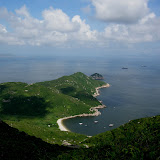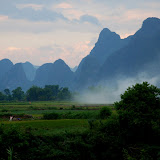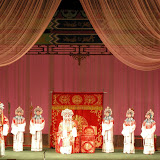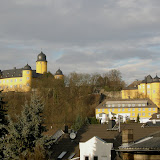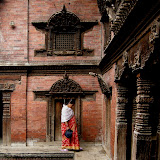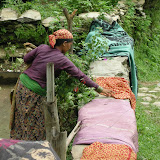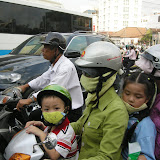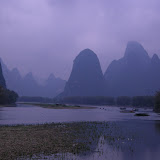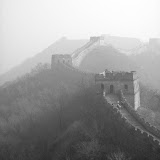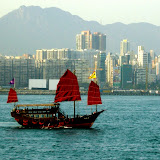在回港的航班上,读完了《灵山》的最后一行文字,转而望向窗外,阳光竟有些刺眼。在这样晴好的日子,从天上望去,香港竟惊人的美丽。在这里生活了五年多,未曾从内心接受过这个城市为家,也从未发现它可以如此之美。如一个永在途中的旅人,我仿佛一直在向着下一个栖息地前行,或是准备前行。
我想去哪里?我在寻觅什么? 在诺贝尔文学奖得主高行健的小说《灵山》中,主人公走在中国西南寻找一个传说中叫灵山的地方。书快结束的时候,他越过了一 条河,觉得离目的地很近了,问路上的一位长者,长者却说:“灵山在河对岸,你越走越远了。” 主人公困惑地问:“我刚从对岸过来啊,如果我从对岸定方向呢?”“还是在河对岸。”长者答。最后,主人公并未到达灵山,而那对他或对我(作为一个读者)都不再重要了。
条河,觉得离目的地很近了,问路上的一位长者,长者却说:“灵山在河对岸,你越走越远了。” 主人公困惑地问:“我刚从对岸过来啊,如果我从对岸定方向呢?”“还是在河对岸。”长者答。最后,主人公并未到达灵山,而那对他或对我(作为一个读者)都不再重要了。
《灵山》并不是一个故事,而是“我”、“你”、“他”,有时也有“她”的一个旅程,有中国古代、现代的历史,民间传说,叙述者童年的回忆,和旅途中邂逅的种种人物。作者试图在一个极其广阔的文化背景中描述人存在中的一个两难困境:人从独处中获得绝对独立的冲动与从人群中找寻温暖的渴望之间的矛盾。而丰富生命的友情可以威胁个体的完整,无一例外的会在力量的挣扎角逐里告终。
我想去哪里?我在寻觅什么? 在诺贝尔文学奖得主高行健的小说《灵山》中,主人公走在中国西南寻找一个传说中叫灵山的地方。书快结束的时候,他越过了一
 条河,觉得离目的地很近了,问路上的一位长者,长者却说:“灵山在河对岸,你越走越远了。” 主人公困惑地问:“我刚从对岸过来啊,如果我从对岸定方向呢?”“还是在河对岸。”长者答。最后,主人公并未到达灵山,而那对他或对我(作为一个读者)都不再重要了。
条河,觉得离目的地很近了,问路上的一位长者,长者却说:“灵山在河对岸,你越走越远了。” 主人公困惑地问:“我刚从对岸过来啊,如果我从对岸定方向呢?”“还是在河对岸。”长者答。最后,主人公并未到达灵山,而那对他或对我(作为一个读者)都不再重要了。《灵山》并不是一个故事,而是“我”、“你”、“他”,有时也有“她”的一个旅程,有中国古代、现代的历史,民间传说,叙述者童年的回忆,和旅途中邂逅的种种人物。作者试图在一个极其广阔的文化背景中描述人存在中的一个两难困境:人从独处中获得绝对独立的冲动与从人群中找寻温暖的渴望之间的矛盾。而丰富生命的友情可以威胁个体的完整,无一例外的会在力量的挣扎角逐里告终。
这本书是当代文学的一部罕见作品。我相信它帮助我向生命的真谛又迈进了一步。
When I finished reading the last line of Soul Mountain on a flight back to Hong Kong, I turned my eyes to outside the window. The light almost hurt. On a fine day, Hong Kong looked astonishingly beautiful seen from above. After more than 5 years living here, I’ve never been able to take the city as a home of my heart, and I’ve nev er realized that it can be so beautiful. Like a wayfarer, I seem to be consistently on the move toward the next destination, or always prepared to.
er realized that it can be so beautiful. Like a wayfarer, I seem to be consistently on the move toward the next destination, or always prepared to.
Where do I want to go? What do I search for? In Soul Mountain, a novel written by Gao Xingjian, a winner of the Nobel prize for literature, the narrator travels through southern and south-western China to search for a legendary place called “Ling Shan (Soul Mountain)”. In the last part of the book, he crossed a river, felt very close to Ling Shan and asked an old man for its location. The old man said “it was on the other side of the river. You are moving farther and farther away.” The narrator got confused and asked: “I’ve already come to this side of the river. What if I use that side to get my bearings?” The old man replied “it’s still on the other side of the river”. In the end, the protagonist did not reach Soul Mountain, but for him and for me as a reader, it appears no longer important.
Soul Mountain is not one story, but a journey of “I”, “You” and “He” and sometimes a “She”, and a collection of ancient and modern Chinese histories, childhood reminiscences, folk tales, and all kinds of people and wanderers encountered on the way. Among many other things, the author tried to deal with “an existential dilemma: man's urge to find the absolute independence granted by solitude conflicts with a longing for the warmth and fellowship which can be given by "the other," be it he or she. At the same time, however, this enriching companionship threatens the individual's integrity and, without fail, ends in some kind of struggle for power.”
This book is a rare work in modern literature. I feel that its transforming power has brought me a step closer to the truth of life. Not an easy one to read, but I recommend it. If possible, read it in Chinese.
 er realized that it can be so beautiful. Like a wayfarer, I seem to be consistently on the move toward the next destination, or always prepared to.
er realized that it can be so beautiful. Like a wayfarer, I seem to be consistently on the move toward the next destination, or always prepared to.Where do I want to go? What do I search for? In Soul Mountain, a novel written by Gao Xingjian, a winner of the Nobel prize for literature, the narrator travels through southern and south-western China to search for a legendary place called “Ling Shan (Soul Mountain)”. In the last part of the book, he crossed a river, felt very close to Ling Shan and asked an old man for its location. The old man said “it was on the other side of the river. You are moving farther and farther away.” The narrator got confused and asked: “I’ve already come to this side of the river. What if I use that side to get my bearings?” The old man replied “it’s still on the other side of the river”. In the end, the protagonist did not reach Soul Mountain, but for him and for me as a reader, it appears no longer important.
Soul Mountain is not one story, but a journey of “I”, “You” and “He” and sometimes a “She”, and a collection of ancient and modern Chinese histories, childhood reminiscences, folk tales, and all kinds of people and wanderers encountered on the way. Among many other things, the author tried to deal with “an existential dilemma: man's urge to find the absolute independence granted by solitude conflicts with a longing for the warmth and fellowship which can be given by "the other," be it he or she. At the same time, however, this enriching companionship threatens the individual's integrity and, without fail, ends in some kind of struggle for power.”
This book is a rare work in modern literature. I feel that its transforming power has brought me a step closer to the truth of life. Not an easy one to read, but I recommend it. If possible, read it in Chinese.



